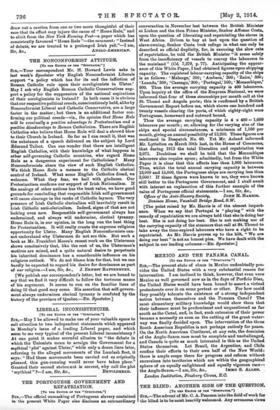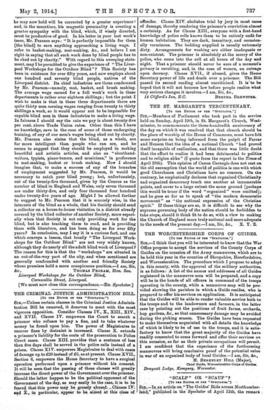THE BLIND: ANOTHER SIDE OF THE QUESTION,
[To ram EDITOR 07 TIM "Srserwroa.n SIR,—The advent of Mr. C. A. Pearson into the field of work for the blind is to be most heartily welcomed. Any erroneous views
he may now bold will be corrected by a greater experience and, in the meantime, his magnetic personality is creating a greater sympathy with the blind, which, if wisely directed, must be productive of good. In his letter in your last week's issue, Mr. Pearson says: "It is perfectly impossible for them [the blind] to earn anything approaching a living wage. I refer to basket-making, mat-making, Ac., and believe I am right in saying that all such work done by blind people has to be eked out by charity." With regard to this sweeping state- ment, may I be permitted to give the experience of " The Liver- pool Workshops for the Outdoor Blind"? This Society has been in existence for over fifty years, and now employs about one hundred and seventy blind people, natives of the Liverpool district. Its chief industries are those condemned by Mr. Pearson—namely, mat, basket, and brush making. The average wage earned for a full week's work in these departments is rather over eighteen shillings ; but the point I wish to make is that in these three departments there are quite thirty men earning wages ranging from twenty to thirty shillings a week, so it would appear not to be impossible for capable blind men in these industries to make a living wage. In fairness I should say the rate we pay is about twenty-five per cent. above Trade Union rates. Other than this I have no knowledge, save in the case of some of those undergoing training, of any of our men's wages being eked out by charity. Mr. Pearson also states that the blind, as a whole, are far more intelligent than people who can see, and he seems to suggest that they should be employed in making beautiful and artistic articles, and also as "shorthand- writers, typists, piano-tuners, and musicians," in preference to mat-making, basket or brush snaking. Now I should imagine that, to make a success of any of the branches of employment suggested by Mr. Pearson, it would be necessary to catch your blind young ; but, unfortunately, out of the twenty-five thousand, given by the Census as the number of blind in England and Wales, only seven thousand are under thirty-five, and only four thousand four hundred under twenty-five years of age. Might I be allowed further to suggest to Mr. Pearson that it is scarcely wise, in the interests of the blind as a whole, that his Society should send a collector on a house-to.house visitation in a district already covered by the blind collector of another Society, more especi- ally when that Society hi not only providing work for the blind, but is also teaching them to read, and is providing them with literature, and has been doing so for over fifty years? In conclusion, may I say it is a curious fact, and one which conveys a lesson, that locally " The Liverpool Work- shops for the Outdoor Blind" are not very widely known, although they do nearly all the adult blind work of Liverpool ? The reason for this is that the " workshops " are situated in an out-of-the-way part of the city, and when mentioned are generally confounded with another and friendly Society whose premises hold a more conspicuous position.,—.1 am, Sir,
Ac., THOMAS PEGRAN, Hon. Seo. Liverpool Workshops for the Outdoor Blind,
Cornwallis Street, Liverpool.
[We must now close this correspondence.—En. Spectator.]















































 Previous page
Previous page